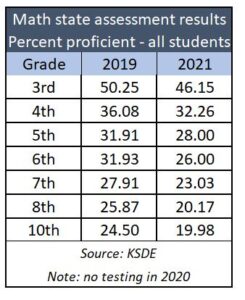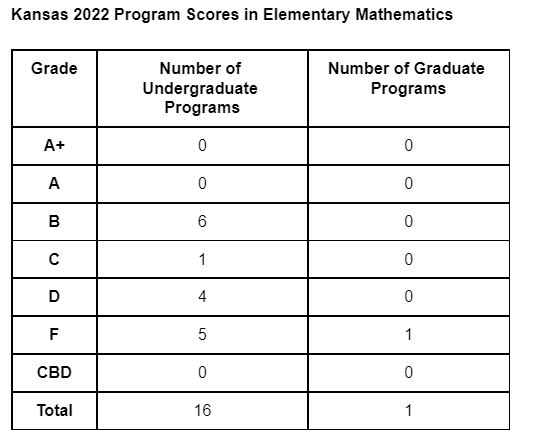The National Council on Teacher Quality (NCTQ) released a report in May on the state of teacher preparation programs in teaching elementary math. Unfortunately, but not surprising, the collegiate institutions across the country, and those specific to Kansas, do not fare well in preparing individuals to teach math. NCTQ graded hundreds of higher education teacher prep programs, including 17 in Kansas.
What NCTQ found in their research mirrors my experience as an elementary teacher. I knew many teachers who struggled when it comes to teaching math. I’ve even witnessed teachers in elementary classrooms tell their students point blank that they’re not good at math. That lack of confidence from classroom teachers translates into fewer hours of math being taught in the classroom. Ultimately, students’ math skills suffer.
Foundational skills in math are essential as students move to the upper grades and into higher level math. The adjoining table shows that for the last two Kansas state assessments, the percent proficient for all students in math decreases as the grade level increases.
the last two Kansas state assessments, the percent proficient for all students in math decreases as the grade level increases.
At the national level, NAEP results are similar. Scores for eighth graders are consistently lower than those of fourth graders. The problem is also manifested in the fact that when it comes to assessments, reading scores are generally higher than math scores.
It’s a reasonable inference that the decrease in math scores as students progress into higher grades is due to the lack of foundational skills impacting math performance. For example, if students haven’t mastered basic math skills taught through the third grade, they have little chance of being successful in basic algebra and solving multi-step word problems in later grades.
The following quote from the NCTQ report is a spot-on analysis of the struggle between elementary teachers and the teaching of math.
As early as kindergarten, the role of teachers in building and cementing these math skills is all-important. Unfortunately, many elementary teachers do not themselves feel adequately confident of their own basic math skills. Potentially lacking confidence or sufficient content knowledge, they may dedicate less time to teaching math than students need, unsure of how to help their students avoid common misconceptions and errors. Compounding the issue, a basic problem for years has been the assumption that anyone who has graduated from high school has all the knowledge they need to teach elementary math. However, teaching elementary math requires a conceptual understanding of foundational mathematics and pedagogical knowledge, neither of which is addressed in a general mathematics course. Preparation programs must dedicate sufficient time to both.
As someone who spent two decades teaching in grade schools, with the final eight specifically teaching math to struggling students, I couldn’t have said it better.
Unfortunately for the students of Kansas, overall teacher prep programs at Kansas colleges and universities do an inadequate job of preparing prospective teachers for teaching math to elementary students.
The following table taken directly from the report shows how NCTQ graded the Kansas teacher prep programs. Not one program earned an “A”. The six that earned a “B” are: Baker, Benedictine, MidAmerica Nazarene, Pittsburg State, KU, and Wichita State. Washburn is the lone institution that received a “C.” Those getting a “D” are Fort Hays State, K-State, Newman and Sterling. Six programs were given an “F”: Emporia State, Friends, K-State (graduate program), Ottawa, Southwestern, and the University of St. Mary. As a comparison, 97 institutions across the nation earned and A+ from NCTQ.
 NCTQ focused their attention on two variables of course instruction that created the overall grade: content and pedagogy. They recommend that teaching candidates take 105 hours of content preparation (three classes). In Kansas, the average is only 57 hours, ranking Kansas 49th out of 51 (D.C. included). Kansas institutions fare better when it comes to pedagogy. NCTQ recommends 45 hours (one class) and Kansas colleges and universities average 54, placing Kansas 14th in the nation. The reason the majority of Kansas teacher prep programs received either a “D” or “F” is related to the lack of coursework required in teaching math content. And taking improvement farther than just the number of hours, NCTQ recommends future teachers take math classes directed specifically to those in teacher prep programs, not the general student population.
NCTQ focused their attention on two variables of course instruction that created the overall grade: content and pedagogy. They recommend that teaching candidates take 105 hours of content preparation (three classes). In Kansas, the average is only 57 hours, ranking Kansas 49th out of 51 (D.C. included). Kansas institutions fare better when it comes to pedagogy. NCTQ recommends 45 hours (one class) and Kansas colleges and universities average 54, placing Kansas 14th in the nation. The reason the majority of Kansas teacher prep programs received either a “D” or “F” is related to the lack of coursework required in teaching math content. And taking improvement farther than just the number of hours, NCTQ recommends future teachers take math classes directed specifically to those in teacher prep programs, not the general student population.
Of course, the colleges and universities need to get better at teaching teachers how to teach math. However, for my money, the underlying problem is not teacher prep programs. It is the societal acceptance that it’s OK to ‘be bad at math.’ How many times have you heard people joke about their lack of math skills? That’s simply not acceptable.
On the other hand, how many times have you heard someone say something like, “I don’t understand what this says, I’m just not good at reading.” No one laughs off a claim to lack reading skills, but it is completely acceptable to suck at math and not be afraid to say it, almost wearing it as a badge of honor.
That has to change, and teacher prep programs are a great place to start.





